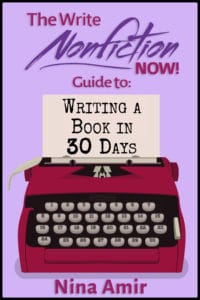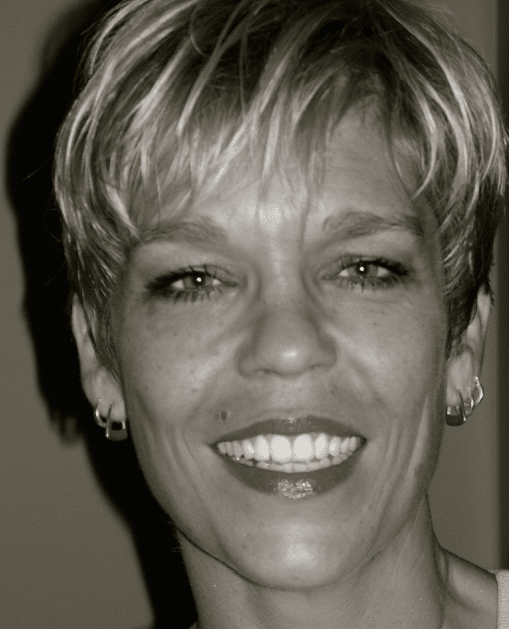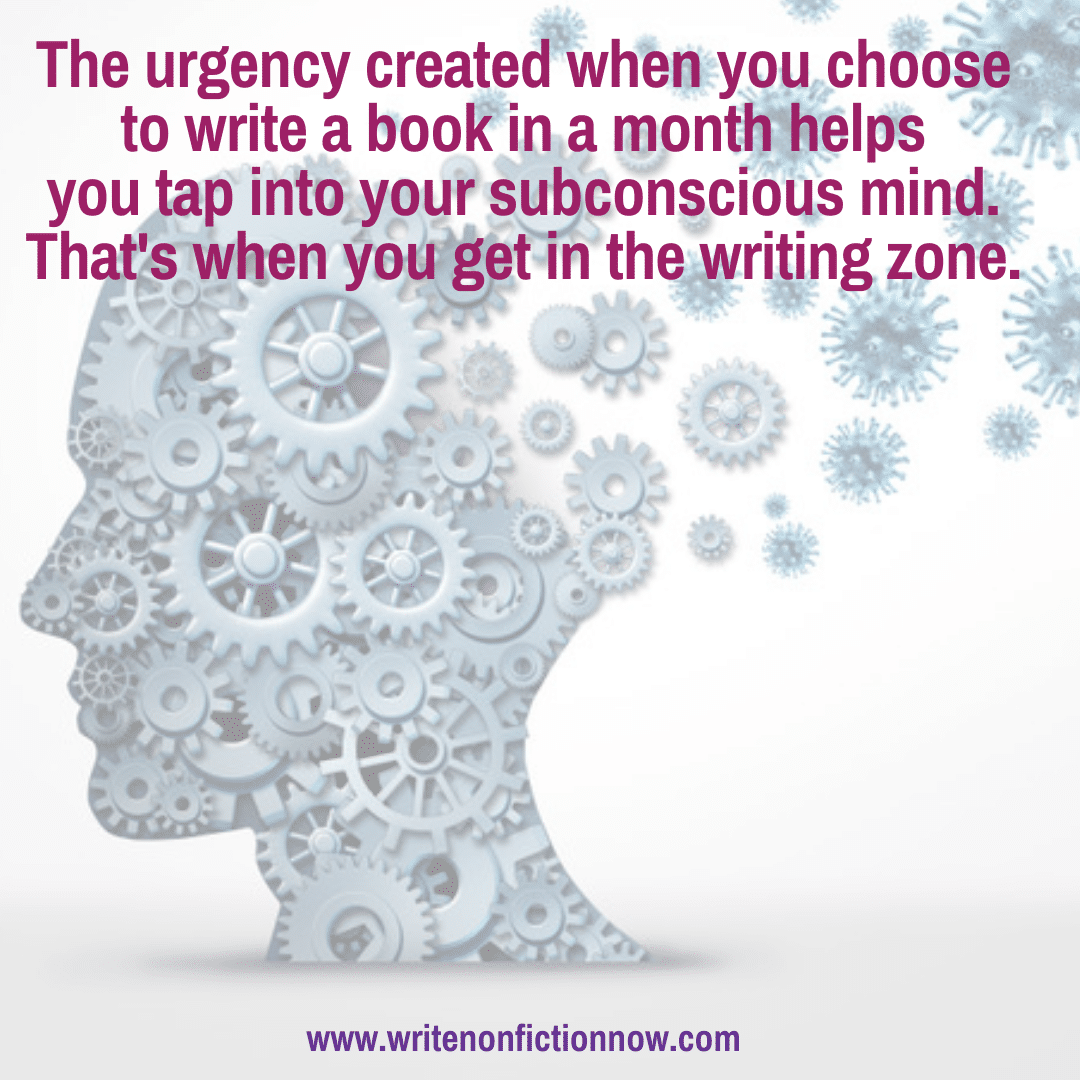All write-a-book-in-a-month events, like the Write Nonfiction in November (WNFIN) Challenge, help you move quickly and effectively through tasks that help you achieve your goal—a completed first draft. And they put you in the writing flow.
Too many writers agonize over a first draft for years, and many overthink and become perfectionistic about their projects. As a result, they don’t get around to writing one word of the manuscript, let alone a complete manuscript in a month. However, when you set a target of writing a book within a limited period—like 30 days—you increase the sense of urgency. Then, the deadline pushes you to act rather than get stuck at the preparation stage or perfectionism.
The urgency created by such a tight deadline necessitates that you write faster than usual and increase your level of focus. Therefore, when you sit down to write, you put all your attention on writing and perform this task with an eye on the clock. After all, you have a deadline to meet! Your focus and urgency trigger your subconscious mind, which puts you in the flow or zone. That’s when writing becomes magically easy.
To help you make the most of the opportunity provided by the WNFIN Challenge, try the following three strategies. Each will help you successfully write a book in a month.
Get into the Zone
When you write quickly, you bypass your conscious mind and analytical thought processes and tap into the wealth of information nestled within your subconscious mind. If you’ve ever found yourself in the writing zone, you know the experience. Words fly from your mind to the screen or paper so fast you can hardly type or write fast enough to record them. The words flow because you are tapped into your subconscious mind.
The subconscious mind absorbs ideas and information that bypass your conscious mind entirely. Therefore, during a 30-day writing challenge, you want to do whatever possible to tap into your subconscious when you write. If you haven’t already tried freewriting to get you into the writing zone, it’s worth experimenting with at the start of November.
Freewriting involves writing with an imposed time limit without thinking about what you are writing during that period. You write as quickly as you can and resist revising, editing, spell-checking, or researching during that period.
Since freewriting creates urgency, this tactic helps you mentally get out of your way and access the wealth of content buried deep within your mind. You write in the moment—no time to allow your mind to wander to the past or future, and, as a result, easily tap into your unconscious information reserve.
Write Every Day
With only 30 days available to complete your writing project, meeting this challenge successfully requires that you use every one of them to build and maintain your momentum. Even if you only write a few sentences or paragraphs on some days, this is better than skipping a day entirely.
 Skipping one day of writing is like standing at the top of a slippery slope. This one day provides you with the excuse to miss another…then another. Before you know it, a week will have passed, and you’ll find it easier to give up than try and make up for lost writing time. You’ll have slid to the bottom of the mountain.
Skipping one day of writing is like standing at the top of a slippery slope. This one day provides you with the excuse to miss another…then another. Before you know it, a week will have passed, and you’ll find it easier to give up than try and make up for lost writing time. You’ll have slid to the bottom of the mountain.
If time is not the issue and, instead, you don’t feel like writing some days or feel your inspiration has dried up, commit to writing for 15 minutes. Half the writing battle is just showing up ready and willing to fight for what’s important to you—writing your book. Show up in your writing space with the mindset of I am a writer; therefore, I write. Then, you’ll be amazed at how easy it becomes to over-deliver on that solitary paragraph or 15-minutes writing commitment you made to yourself.
Additionally, if you write every day in November, you’ll develop a daily writing habit. That habit will keep your writing momentum going this month and beyond. You stop wondering if you will write today and know that you sit down and write daily because…well…it’s your habit to do so.
Let Go of Perfection
As writers, we often put too much pressure on ourselves to achieve perfection when writing a book. Remember, during the WNFIN Challenge, you’re not writing the final draft; you’re writing the first draft. As a result, the manuscript you produce during November be peppered with errors, bad grammar, spelling mistakes, and redundancies. Some of the content will be so bad that you’ll cut it and drag it into the trash.
Give yourself permission to write badly. If you’re a perfectionist, this is a tough ask, but it’s a good habit to get into if you want to complete a first draft within 30 days. To accomplish though, you’ll need to be aware when your Inner Critic begins weighing in on what you’re writing.
I vividly remember writing the first draft of my first book. I agonized over sentence and paragraph structure, and my first draft took more than six months to complete. By the time it was written, I was fatigued by reviewing and re-reading my content. When it came to self-editing the completed draft, I almost gave up. Avoid this scenario by barging through your first draft at breakneck speed.
There’s an added bonus to this approach. Not only do you finish your first draft in a month but, when you reread it during the self-editing phase, it will seem like you are reading it for the first time. Seeing your work with fresh eyes is imperative if you want to revise and edit well.
Don’t Edit While You Write
I love this quote by author Jodi Picoult: “You might not write well every day, but you can always edit a bad page. You can’t edit a blank page.”
Look at writing and editing as two distinctly different phases, and during November, only focus on writing.
Editing as you write your first draft is a big no-no. It’s a sure-fire way to ask your Inner Critic to participate in the writing process, which slows you down considerably. Plus, it’s a procrastination technique that keeps you from drafting the following sentence. It anchors you to a spot in your manuscript, so you can avoid writing something new.
While you will eventually want to utilize proven editing techniques, wait until December to start revising. Right now, focus on productivity while challenging yourself to let go of any desire to edit or revise. Here are a few editing traps to skirt during the WNFIN Challenge:
- Avoid reviewing your paragraphs during your writing session. Your writing sessions are for writing, not for reading. So avoid the temptation to write a sentence or paragraph and keep re-reading it to make it perfect. Now is not the time to tease your rough first draft paragraphs into a thing of beauty.
- Stop fixing spell mistakes. Don’t get distracted and search for the correct spelling. If you have your writing program set to alert you to every spelling or grammar error, turn it off. Those red or underlined words will become distractions. And you’ll need a steel will to avoid fixing them on the spot.
- Don’t search for the perfect word. You will get pulled out of the writing zone when you can’t think of the right word for a sentence and search for it. Rather than continuing to write, you may pause to encourage it to appear in your conscious mind. Often, I think of a similar word, but not the one I want. That’s when I’ll open an online thesaurus and search for the word. While this gets the right word inserted, it breaks my subconscious stream of content and makes it difficult to get back into the writing zone. Plus, it wastes writing time. If you can think of a similar word, but you know it’s not the right one, put () around the word, e.g., (delicate), or add text that is easy to find in a document search, e.g., delicateXX or (synonym). You can type these cues without breaking your flow. If you can’t think of the word you want to add, you also can simply add XX or __ in its place. Then address all of these missing words in the first round of self-editing.
Writing a first draft—messy or neat—should be your November goal. To accomplish it, write fast. Full steam ahead. Don’t spare the horses… and any other idiom that motivates you to write quickly.
At the end of 30 days, can you imagine having a finished first draft to polish? How good with that feel? Your sense of achievement will be immense. There’s no time to waste—November and the WNFIN Challenge are upon us. Let’s write!
How do you get in and maintain your writing flow? Tell me in a comment below, and, please, share this post with a friend who would like to write a book in a month.
About the Author
Jay Art ale abandoned her corporate career to become a digital nomad and full-time writer. She’s an avid blogger and a nonfiction author helping travel writers and travel bloggers achieve their self-publishing goals. Join her at Birds of a Feather Press where she shares tips, advice, and inspiration to writers with an independent spirit.
ale abandoned her corporate career to become a digital nomad and full-time writer. She’s an avid blogger and a nonfiction author helping travel writers and travel bloggers achieve their self-publishing goals. Join her at Birds of a Feather Press where she shares tips, advice, and inspiration to writers with an independent spirit.
 Do you want to learn more about becoming a nonfiction author? Check out the Nonfiction Writers’ University. Get the education and coaching to help you succeed as a nonfiction writer. Take advantage of monthly live group author coaching, and gain access to a an extensive archive or educational resources, like interviews with experts, challenges, homework assignments, courses, and ebooks. If you’ve wanted one place to go for all your nonfiction writing and publishing needs, this is it. And if you’ve wished you purchase Nina Amir’s best courses or could hire her as your author coach, now you can…for a small monthly investment. Enjoy a 30-day trial membership for only $1.
Do you want to learn more about becoming a nonfiction author? Check out the Nonfiction Writers’ University. Get the education and coaching to help you succeed as a nonfiction writer. Take advantage of monthly live group author coaching, and gain access to a an extensive archive or educational resources, like interviews with experts, challenges, homework assignments, courses, and ebooks. If you’ve wanted one place to go for all your nonfiction writing and publishing needs, this is it. And if you’ve wished you purchase Nina Amir’s best courses or could hire her as your author coach, now you can…for a small monthly investment. Enjoy a 30-day trial membership for only $1.
Photo courtesy of lightwise.
